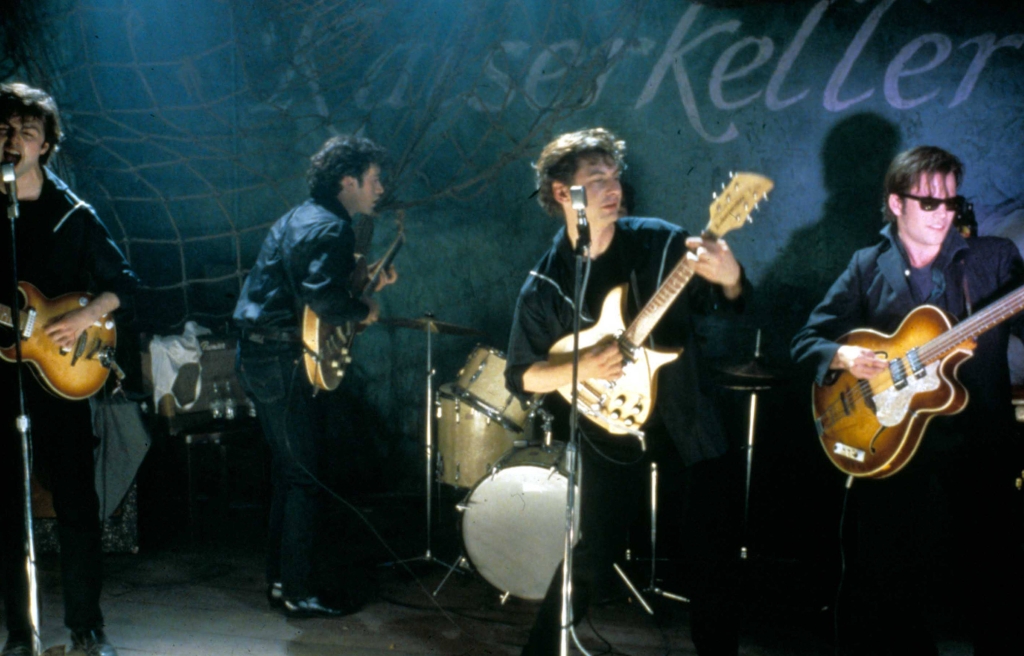It has been 30 years since Iain Softley’s music biopic Backbeat first hit cinemas. The film follows the Beatles in their formative years, playing Hamburg nightclubs before making a single recording. More specifically, the film focuses on reluctant bassist and fine artist Stuart Sutcliffe and his volatile friendship with lead singer John Lennon. The film received relatively mixed reviews upon release, I think because the film that was advertised was not the film that Softley had made. This is less a factual account of the Beatles’ early days and more a drama about a brotherly friendship and choosing one’s way in life. Any viewers looking for Ringo Starr will go away disappointed – he hadn’t joined the band at this stage. Anyone expecting insight into Paul McCartney, George Harrison, or original drummer Best Best will be disappointed as well. Backbeat belongs almost exclusively to Sutcliffe (Stephen Dorff), Lennon (Ian Hart), and German photographer Astrid Kirchherr (Twin Peaks’ Sheryl Lee).
The film picks up in 1960 as Sutcliffe abandons an opportunity to further his painting career in order to join Lennon, McCartney, Harrison, and Best in a house band opportunity in Hamburg, West Germany. There he meets and shares a romance with Astrid Kirschherr, much to Lennon’s distaste. As Sutcliffe’s relationship deepens, and Lennon fears he may leave the band, tensions rise between the pair.
There is not a complicated story at Backbeat‘s heart, leading it to rely on the performances and the production to push the audience along. In the latter sense it does rather well, with a good sense of time and place and solid photography from Ian Wilson. As regards the former, the acting is generally top-notch. If there is a ‘most valuable player’ to this film it is Ian Hart, who blends an uncannily accurate voice with perfectly mimicked mannerisms and an impressive depth of character. He essentially inhabits John Lennon in a fashion that biographical pictures rarely manage: typically an actor will either look the part or give a strong performance. They rarely manage both. What feels particularly effective is Hart’s rage as Lennon. He builds a three-dimensional and decidedly w0rking-class persona: deeply emotional but bottled up, enormously passionate but self-sabotaged by resentments. Most critically it rings true.
In a sense Stephen Dorff – then at the height of his popularity – had the easier job, since Sutcliffe never had the opportunity to hold the public’s attention like his bandmates did. In that regard he has a freer job to build his character, and does it very well. At first he does not seem to quite resemble the Sutcliffe seen in the real Astrid Kirchherr’s photographs – until he gets a fresh haircut and becomes a practical doppelganger. Dorff shares exceptional chemistry with Sheryl Lee as Kirchherr, and she in turn builds a wonderfully sympathetic and well-rounded character. Critically for all three leads, they play flawed characters. Their quirks and failures ensure the central narrative never becomes one-dimensional or twee.
By no means is the film faultless. It does not quite seem to know when to end for one thing. For another, while Gary Bakewell plays a remarkably familiar Paul McCartney, McCartney himself is let down by a screenplay that minimizes his own friendships with Lennon and Sutcliffe as well as his pivotal role in the band’s foundation.
Given the early setting in the band’s history, not to mention the ruinously expensive licensing rights, none of the Beatles’ own music is heard in the film. Instead they play an array of rock cover versions, recorded exclusively for the film by a brace of 1990s talent including Henry Rollins, Dave Grohl (Nirvana), Dave Pirner (Soul Asylum), Thurston Moore (Sonic Youth), and Mike Mills (REM). Collectively they give the music an energy and immediacy that helps immerse the viewer in the concert sequences.
The smartest decision made regarding Backbeat was to avoid trying to cover the Beatles themselves in a single picture. Instead Softley selected one neatly contained slice of their history, and told a straightforward and enjoyable drama in its own right. 30 years on, and it remains a quietly excellent piece of work.





Leave a comment